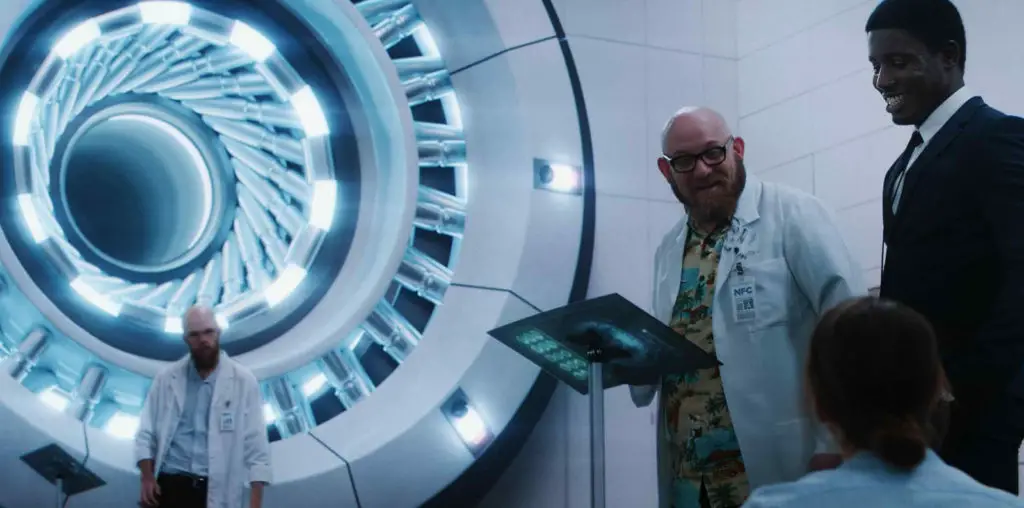
Welcome to the Texas trailer home of Ansel Smith (Thomas Haden Church), a dumb-as-dirt welder, and Sharla (Gina Gershon), his slutty second wife. Smell the booze-stained carpets. Hear the relentless bark of a chained pit bull. Gaze at Sharla’s bare pubic mound, as she saunters about this cramped cracker box half-dressed. As envisioned by director William Friedkin (“The Exorcist”) and playwright Tracy Letts, behold the low-rent hillbilly haven of “Killer Joe.”
Before getting hitched to pouty lipped, potty-mouthed Sharla, Ansel fathered two children with an off-screen ex-wife. Chris (Emile Hirsch), his scraggly young numbnuts of a son, is blessed with a mammoth mouth and cursed with the inability to shut it. Daughter Dottie (Juno Temple), a naive 13 year-old stuck in the middle of this horrid hovel, dreamily awaits rescue by a Handsome Prince. Or a toad. Anyone.
As “Killer Joe” begins, we learn that Chris’ mother has snorted up his stash of drugs. Unfortunately, the spent contraband belonged to local gangster Digger Soames (Marc Macaulay), who reassures Chris that “I’ll wrap you in electrician’s tape and bury you ten feet deep,” if the debt is left unpaid. But conniving synapses are still firing in Chris’ stunted redneck brain. From the flesh ‘n neon confines of a local strip club, Chris entrusts Ansel with a sordid scheme to put himself back in the black. Why not kill Chris’ despised mother, and collect on her hefty life insurance policy?
“This is MURDER we’re talkin’ about,” exclaims Ansel, a rare spark of awareness igniting inside his rusty noggin. Even so, dad gives Chris a reluctant thumbs-up. Perhaps realizing that they’re too incompetent to carry out the murder themselves, the heinous hicks hire “Killer” Joe Cooper (Matthew McConaughey), full-time cop and sometimes hit-man.
Hidden beneath black leather jacket, sunglasses, and ten-gallon hat, Joe might inhabit the sweltering heat of Texas, but he’s a callous psychopath with ice-sickle veins. Joe’s terms are non-negotiable. “Twenty five thousand in advance,” he tells Chris and Ansel. Obviously, this poses one big problem. Father and Son don’t have any up-front cash to finance this sordid deal until after the insurance loot is collected. But Joe might consider an exception. Eyeing the virginal Dottie from a distance, Joe suggests a “retainer.” He’ll have sexual access to the under-aged girl until payment is secured.
“Killer Joe” culminates in a series of double-crosses and unflinching ultra-violence. There are some truly uncomfortable scenes that echo Lynch and Scorsese at their most intimately disturbing. Forbidden seductions and threatening interrogations are played out in agonizingly prolonged stretches. And you will never again look at the likeness of Colonel Sanders with anything less than hyper-vigilant suspicion. “Killer Joe” will do for chicken what “Psycho” did for showers. Call it Kentucky Fried Cinema.
But take away the squirm factor, and Friedkin’s latest is, as they say in Texas, “all hat and no cattle.” “Killer Joe” fails by trying to be all perversions to all people. It’s darkly funny, uncomfortably cringe-worthy, goofy again, then jarringly brutal. Friedkin can’t sustain a consistent tone, and the film feels uneven and all over the map.
Meanwhile, characters act in ways that are similarly inconsistent. One moment, Chris is pimping out his sibling for personal gain, and then turning all stoic as her protector. Meanwhile, Joe trades in cold, careful pragmatism for reckless abandon. As “Killer Joe” starts out, stone-faced McConaughey is a grim-reaper cowboy and master of efficient practicality. This is a guy who knows how to cover his tracks. An hour later, he’s all gregarious smiles ‘n giggles, serving up Tuna Casserole to Dottie and frolicking about the Smith trailer in reckless plain sight.
As for the bloodbath of an ending…. did I miss something? There’s a violent climactic outburst where most of the ensemble gang up on one particular character. I was left scratching my head over who dished out the damage, and who was on the receiving end.
This leaves Gershon and Haden Church to salvage the show. Employing that pricelessly clueless, deeply befuddled expression Church immortalized in “Sideways,” Ansel remains several incompetent steps behind the pack. Not until the final frames of “Killer Joe” does this ditzy dad awaken from his pickled slumber, eyes wide open to the many deceptions playing out behind his back. Meanwhile, Gershon plays Sharla as a shrewd tramp who trounces around naked even as she conceals a hidden agenda.
If “Killer Joe” was a bucket of KFC, you’d find some meaty pieces (including ample breasts and thighs). The rest, however, is bones and grease. You’ll either leave this sick hick pic with an upset stomach, or a hunger for something more evenly-baked.

The confusion in the last act was not so for me. (No spoilers). Notice that the amount of the insurance policy changes as they discuss it and that there’s a mostly-unseen character who connects the victim and the loving family who gets her killed. I agree that these things were too easy to miss. Nontheless, Friedken is a master as converting plays into real cinema (Bug, Boys in the Band).
Point taken. I misinterpreted Dottie’s age, which wasn’t explicitly stated in the film. I’m also not familiar with the original play’s script, which apparently clarified this in more detail.
Dottie is not thirteen. She is not underage. She is twenty.
True, that text is not in the movie, but it is in the play; and in the film, while at dinner with Joe, she specifically tells a story about “when I was sixteen..”, so she’s at least older than that. There are numerous hints throughout that she is of legal age, not least of which are her fully developed naked body and the fact that her father and brother express surprise that she’s not “seeing anybody yet” and that she’s still a virgin. These are not things you say about a thirteen-year-old in the family, even a redneck family.
The movie is plenty depraved on its own, and doesn’t need the assistance of misrepresentation.